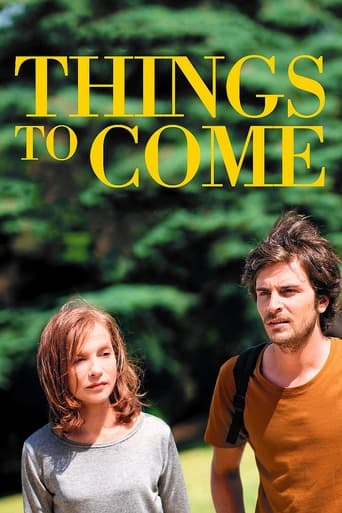NekoHomey
Purely Joyful Movie!
Holstra
Boring, long, and too preachy.
Afouotos
Although it has its amusing moments, in eneral the plot does not convince.
Geraldine
The story, direction, characters, and writing/dialogue is akin to taking a tranquilizer shot to the neck, but everything else was so well done.
axapvov
As Claude Chabrol said, "Isabelle Huppert makes her own films, the director and everybody else are just there to help". This one is perfectly suited for her restrained style. A woman´s life is changing considerably and she carries on. Simple enough but oh there´s so much more to it. This realistic story-telling makes a short scene of her tearing up in the car more effective than a full house melodrama. A serious, intelligent film with poignant reflections on maturity, idealism and more. The realism holds its logic all the way until the ending.For someone used to french cinema it isn´t that outstanding but it´s such a serious piece of film-making it stands out among the rest. In my opinion the last section could have been trimmed and I have a couple of petty complaints but overall it´s still a compelling film. A pleasant drama that should easily satisfy anyone who knows what they´re getting into.
pastapenne-39502
To all those people who voted it 5 star plus, folks, ..lets not be pretentious.... any normal sane person would see how slow, pointless and boring the film is. The director put more emphasis on philosophy than the lead character. The mountain scenery and the pet cat were the only bright moments in the film
geltner
The pace of the film is very slow and at times boring. The story is slow to appear and the ending is unsatisfactory. There were some discussions of philosophy which I found murky. The acting and casting seems fine. The plot is that of a middle aged woman who's husband leaves her for a younger woman. She seems not to suspect anything beforehand and we see some of her emotional response. The depiction of the lifestyle of an intellectual family in Paris is interesting but the lives of the two children are poorly developed which, I imagine, is purposeful. The director seems to want a laser focus on the main character, Isabel Hubert. She is a fine actress and plays the part with style.Overall, it is just not enough of a plot, not enough action, to keep the interest of the viewer. I wish we could see more french films here in the USA since I'm a fan of french cinema, in general.
maurice yacowar
The Donovan song's tension between seeking an impossible purity and living a deep peace establishes the film's central theme and heroine Isabel's primary virtue. She lives a live of immediate, accepting presence. She won't be tempted by shallow rewards or depressed by disappointments. She embodies the strength and resilience of the examined life. As the Rousseau quote declares, desire is the enemy of happiness. Our failed satisfactions are based upon the desire for something new — which, once achieved, no longer satisfies. Isabel has lived through the political temptations of her time, from her flirtation with communism through the '68 revolution. So she's not tempted by the current students' strike for pensions or her star ex-student Fabien's anarchism. In contrast, her husband stays stuck in the attitudes he held at 18 and has the rigidity and insensitivity to tyrannize his students. Isabel finds real value and fulfilment in teaching philosophy to her high school students, training them to think for themselves and taking an interest in their lives. She has a stoic response to her publishers' initial insistence on jazzing up her textbooks, then suspending their publication altogether. Her integrity won't allow her to abandon her values. She has the dignity and self-respect to accept their abandonment with aplomb. That also sustains her through her husband's abandonment for a younger woman. As briskly as Isabel cuts loose from him she ends her connection to his family's country home where they vacationed every summer and where she planned and cultivated her garden. In all their scenes together she conducts herself with strength and an absolute rejection of self-pity. This self-sufficiency supports her when she visits Fabien's mountain retreat and when her fragile yet demanding mother dies. A scene with an importunate stranger at a cinema shows her refusal to seek carnal reaffirmation. Her grandson's birth shows her instead embracing the role of grandmother, fully and warmly. In the last scene Isabel hosts a Christmas dinner with her children. To let her daughter eat, Isabel goes to tend to the crying baby, stilling him with yet another song. With the family dinner framed out of the shot on the left and Isabel and the infant framed out on the right, the shot focuses on the shelves of books between them. The film is about the use of those books, i.e., the traditional function of philosophy — detached from the fashions of the day in pedagogy or politics — to address the one essential question: How should we live our life? Aptly, the last song is "Unchained Melody," which turns an exultation in freedom into a love song. The Schubert song and the Woody Guthrie ballad both provide imagery of transcending the mundane reality by discovering the ethereal around it. The other characters live to pursue new pleasures, which inevitably fail to satisfy them. The husband's new woman has left him alone for Christmas, apparently not yet ready to introduce him to her family. Fabien and his German friends debate the political uses of anonymity or the collective authorship (i.e., the death of the author or the personal, a recently fashionable fiction). Isabel's daughter has wanted a baby but at the tension between her parents dissolves into tears and needs to hold him again. As if he will give her the stability she lost through her father's infidelity. The preacher similarly cites Isabel's career as a philosophy teacher to be the proper justification for her mother's life of pain, isolation and abandonment. And then there is Pandora. This is the obese, willful, all-black cat that Isabel inherits from her mother, is allergic to and impatient with, and finally leaves at Fabien's retreat. Far from the traditional Pandora, who unleashed the world's evil winds, this one is a minor key replay of Isabel's themes. Pampered by Isabel's mother, Pandora hides from whoever else enters her mistress's flat. She's heavy to carry, like the unwanted burdens we all have periodically thrust upon us. But like Isabel she has a feral intelligence and instinct. This house cat takes off into the forest but has the instincts to survive and find her way home in the morning, bringing her new mistress back a dead mouse. In her instinctual survival and her integrity the cat is another reflection of our wise, warm and worldly philosopher. The film is titled L'Avenir, "the future." Written and directed by a woman, it offers a real rarity: a heroine of intellect, will and strength. That's a refreshing new kind of superhero.

